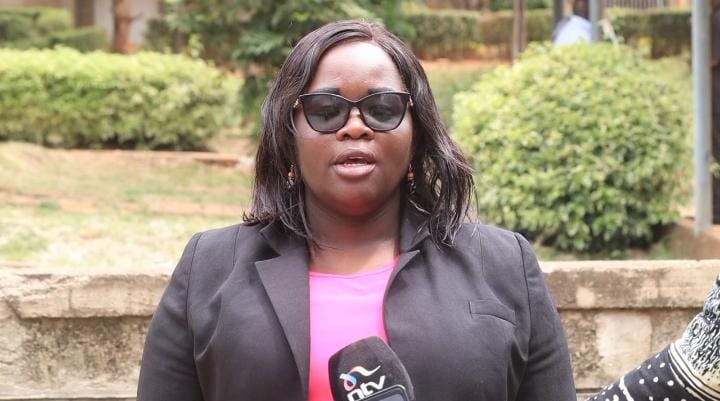 Faith Ngige, the national coordinator of KPCG in an interview with the Media in Machakos. Photo by Virginia Siebella.
Faith Ngige, the national coordinator of KPCG in an interview with the Media in Machakos. Photo by Virginia Siebella.
By Virginia Siebella and Ryan Mumo
As climate change continues to batter Kenya’s food-producing regions with erratic rainfall and prolonged droughts, farmers in Machakos County are turning to ecological farming — not merely as a technique, but as a movement rooted in resilience, dignity, and environmental justice.
At a recent community forum convened by the Kenya Platform for Climate Governance (KPCG), in partnership with Fastenaktion, the Catholic Diocese of Machakos, and PACJA, farmers, grassroots organizations, and local leaders from Machakos and Makueni counties gathered to explore how ecological agriculture can secure both livelihoods and the land.
For Robert Ngunzu, a farmer from Machakos, the shift to ecological farming began in 2017 — a decision he says has transformed his outlook on agriculture.
“Before, I depended entirely on chemical fertilizers and unpredictable rains,” Ngunzu said. “Now, I use organic compost, conserve water, and my farm still produces even when others dry up.”
The shift, he says, has not only improved his yields but also restored a sense of purpose and control over his farming future.
According to Stellamaris Mulai from Fastenaktion, ecological farming should nourish the farmer economically while also safeguarding their health and the environment.
“Farming must sustain both the farmer and the planet,” she said. “We are helping communities see that climate justice and food security are deeply connected — and that farmers can benefit from carbon markets when they adopt sustainable practices.”
The forum also spotlighted the Financing Locally-Led Climate Action (FLLoCA) program, which supports counties in implementing climate-smart solutions.
Through FLLoCA, farmers can potentially earn income from carbon credits while adopting sustainable practices such as planting drought-resilient crops and restoring degraded soils.
However, not all farmers are benefiting yet. John Mwaniki, a community representative in Machakos, noted that accessing these funds remains a major hurdle.
“The money exists, yes — but it rarely reaches the farmer directly,” Mwaniki said. “It’s channeled through ward climate committees, and by the time it gets to the ground, the season has already changed.”
Faith Ngige, the national coordinator of KPCG, emphasized the need for counties to fully implement the National Agroecology Policy and Strategy (NAPS), which formally recognizes ecological farming as a viable and supported practice.
“Machakos is showing leadership, but we need more counties to act,” Ngige urged. “Ecological farming is not just about crops — it’s about justice, livelihoods, and the future of our food systems.”
Faith-based leaders are also at the forefront of this transformation. Father Januaris Kioko of the Catholic Diocese of Machakos leads farmer groups that combine spiritual encouragement with practical training on soil conservation, organic pest control, and rainwater harvesting.
“We teach that caring for the earth is an act of faith,” Father Kioko said. “When farmers see that their work honors creation, they farm with pride and patience.”
Across Machakos and Makueni, the growing movement toward ecological agriculture is offering hope amid uncertainty. For many, it represents not just a farming method, but a moral and economic awakening — one that could secure Kenya’s food future in an era of climate crisis.
“Ecological farming is about survival,” Ngunzu reflected. “But it’s also about dignity — feeding our families without destroying the land that feeds us.”